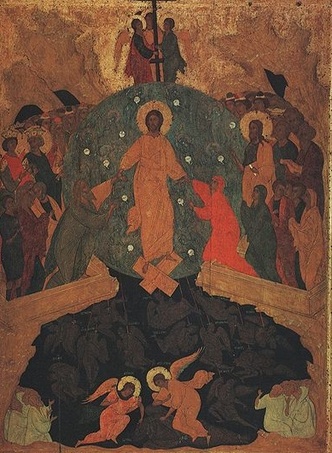 Not too long ago we posted a series on what is now being called evangelical universalism, and if you recall it is a view that believes death results from sin, and that following death unbelievers experience hell. But the big issue here is the finality of death. Is death final? Is there a possibility that death is not final, or that hell as the second death could end?
Not too long ago we posted a series on what is now being called evangelical universalism, and if you recall it is a view that believes death results from sin, and that following death unbelievers experience hell. But the big issue here is the finality of death. Is death final? Is there a possibility that death is not final, or that hell as the second death could end?
I don’t know if you know about this, but the Eastern Orthodox Church has a major emphasis on Good Friday through Easter and the emphasis is on what is sometimes called the “harrowing of hell,” the descent of Christ into hell between the Cross and the Resurrection. The idea is that Christ entered into Hades after his death and raided hell to ransom the righteous of the Old Testament.
Clearly, then, the death prior to Christ’s death was not final. Is the death after the death of Christ final, then?
This Lent I’m reading the pious and and learned study of Archbishop Hilarion Alfeyev (Christ the Conqueror of Hell: The Descent into Hades from an Orthodox Perspective
), mostly because I’ve always wanted to read a good piece by an Orthodox theologian on the Eastern (and traditional) sense of the “descent into Hades,” an article in our creed. There are a number of NT texts that, while open to dispute, have been traditionally understood as referring to Christ’s descent into hades and they are, if so, clear signs that one kind of death was not final.
), mostly because I’ve always wanted to read a good piece by an Orthodox theologian on the Eastern (and traditional) sense of the “descent into Hades,” an article in our creed. There are a number of NT texts that, while open to dispute, have been traditionally understood as referring to Christ’s descent into hades and they are, if so, clear signs that one kind of death was not final.
Matthew 12:40: For just as Jonah was in the belly of the huge fish for three days and three nights, so the Son of Man will be in the heart of the earth for three days and three nights.
Matthew 27:51-52 Just then the temple curtain was torn in two, from top to bottom. The earth shook and the rocks were split apart. And tombs were opened, and the bodies of many saints who had died were raised. (They came out of the tombs after his resurrection and went into the holy city and appeared to many people.)
Acts 2:31: David by foreseeing this spoke about the resurrection of the Christ, that he was neither abandoned to Hades, nor did his body experience decay.
1 Peter 3:18-21: Because Christ also suffered once for sins, the just for the unjust, to bring you to God, by being put to death in the flesh but by being made alive in the spirit. In it he went and preached to the spirits in prison, after they were disobedient long ago when God patiently waited in the days of Noah as an ark was being constructed. In the ark a few, that is eight souls, were delivered through water. And this prefigured baptism, which now saves you – not the washing off of physical dirt but the pledge of a good conscience to God – through the resurrection of Jesus Christ, who went into heaven and is at the right hand of God with angels and authorities and powers subject to him.
1 Peter 4:6: Now it was for this very purpose that the gospel was preached to those who are [now] dead, so that though they were judged in the flesh by human standards they may live spiritually by God’s standards.
Eph 4:9: Now what is the meaning of “he ascended,” except that he also descended to the lower regions [of] the earth?
Rev 20:14: Then Death and Hades were thrown into the lake of fire. This is the second death – the lake of fire.

